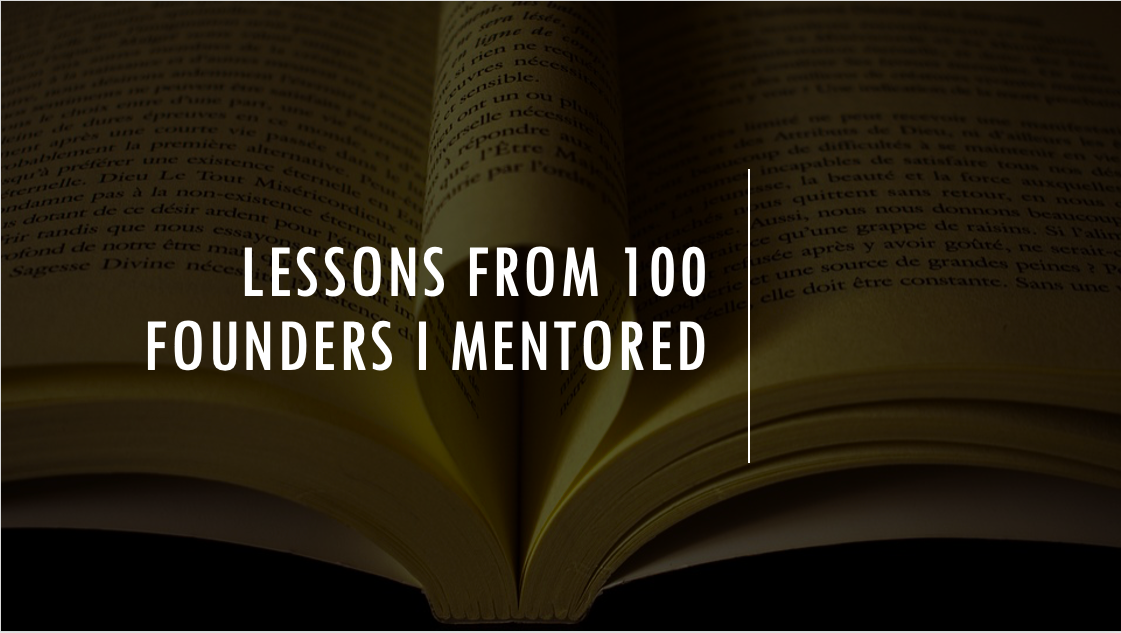The Mirror Works Both Ways
Over the last two decades, I’ve sat across tables, Zoom screens, and coffee mugs with over a hundred founders, dreamers, doers, disruptors. Some came to me at their lowest, others at their peak; many simply stood at that confusing middle ground where vision meets chaos. And through every story, I’ve realised something simple yet profound, I may have mentored them, but they taught me just as much.
When I first began mentoring, I thought my role was to guide, to help founders find clarity, focus, and direction. But with time, I understood that mentoring isn’t a transfer of wisdom; it’s a reflection of it. Each founder held a mirror to a part of me, the impatient visionary, the struggling leader, the self-doubting woman, the relentless fighter, and the lifelong learner. From those 100 journeys, I’ve distilled lessons that aren’t found in any startup playbook or MBA course. They are lessons from human stories, from boardrooms and burnout, from scaling highs and sleepless lows, from messy pivots and magical turnarounds.
Lesson 1: Vision Doesn’t Die, It Just Hides Behind Fatigue
One of the first things I learned mentoring founders is that clarity doesn’t disappear; it simply gets buried under exhaustion. I’ve seen brilliant founders mistake tiredness for loss of purpose. They push harder, confuse busyness for progress, and forget that fatigue clouds direction faster than failure does. During our mentoring sessions, I often pause and ask one question: ‘When was the last time you felt excited about your business?’ The silence that follows says everything.
The truth is, burnout is not a badge of honor. Vision needs rest, not retreat. Some of the most powerful breakthroughs have come when founders stepped away for a day, a walk, a weekend and came back to see what was always right in front of them.
Lesson 2: Founders Don’t Need Cheerleaders. They Need Mirrors
Many assume mentorship is about motivation. But my founders will tell you, I’m not your ‘feel-good’ mentor. I’m the mirror that won’t lie. Over time, I’ve realised that real progress happens when founders see themselves clearly, both their brilliance and their blind spots. One of my mentees once told me, ‘Salma, you don’t tell me what I want to hear, but what I need to face.’ And that became a silent motto of my mentoring journey.
As founders, we surround ourselves with people who validate our hustle. But true growth happens when someone helps you declutter your path, when they strip the story of excuses and make you face the uncomfortable truths. Because scaling a business is rarely about strategy alone. It’s about clarity, of self, of purpose, of priorities. That’s why my framework has always been simple: Unclutter the path to progress.
Lesson 3: Numbers Speak — But So Does Energy
Working with founders across India, Europe, MENA, and Southeast Asia taught me this: you can sense when a company is about to grow, not just from its data, but from its energy. I’ve walked into offices where the numbers looked perfect but the energy was dead and into tiny rooms where the energy was electric, even when revenue hadn’t arrived yet. The biggest insight? Energy always precedes growth.
As a mentor, I began mapping both, the hard numbers and the soft signals. Growth Strategy Action (GSA) sheets tracked the KPIs, but my Execution Readiness Wheel measured something deeper: mindset, alignment, discipline, and emotional bandwidth. Because I’ve learned that companies don’t fail for lack of strategy, they stumble when the founder’s energy, clarity, and culture collapse under the weight of ambition. So before we scale, we first stabilize the founder. Always.
Lesson 4: Every Founder Has a Shadow
Some founders are visionaries but poor executors. Others are meticulous planners who freeze when plans go wrong. Many are natural leaders who struggle with delegation because they equate control with care. I’ve learned to see the shadow traits that silently hold them back. These are not weaknesses, they’re just unintegrated parts of the founder’s personality. My role has never been to erase these shadows, but to help founders make peace with them. To teach them that you don’t have to be perfect to grow, you have to be aware. Because self-awareness, not perfection, builds sustainable companies.
Lesson 5: Culture Is Not Built in Off-sites, It’s Built in Mondays
One of my proudest realizations is that culture is the quiet rhythm between meetings, not the noise at retreats. It’s how a founder responds to a mistake, how they greet their team in the morning, how they close a tough week. During my Leap Law and Vision to Reality workshops, I’ve seen leadership teams light up when they connect the dots between legal integrity, business clarity, and human trust. The realisation hits your agreements, your team, your tone, all form your company’s culture long before you write a handbook. So when a founder says, ‘I want a stronger culture,’ I tell them, ‘Then start by showing up as a stronger you, consistently.’
Lesson 6: Detachment Doesn’t Mean Disinterest
As a mentor, I’ve learned to love my founders deeply, but without attachment. It’s a fine balance: you root for them fiercely, but you don’t carry their weight. I used to lose sleep over their struggles, their funding rounds, team exits, personal breakdowns. But one founder taught me a powerful truth: ‘Salma, I can’t borrow your strength forever. I need to find mine.’ That day changed me. I realized mentorship is about holding space, not holding control. It’s about walking beside someone, not ahead of them.
Lesson 7: Growth Needs Subtraction Before Addition
Every founder I’ve mentored hits a point where growth stalls, not because they lack ideas, but because they’re doing too much. We confuse movement for momentum. But scaling requires subtraction, removing distractions, trimming chaos, saying no to what doesn’t serve the next level. It’s why I often tell my founders: ‘Growth isn’t about adding more, it’s about doing less, better.’ And when they do that, everything aligns, strategy, systems, soul.
Lesson 8: Mentorship Is a Two-Way Street
If there’s one overarching lesson, it’s this, mentorship is a shared transformation. Every founder I’ve guided has, in some way, mentored me too. They’ve reminded me of resilience when I felt tired. They’ve shown me what humility looks like when success arrives. They’ve reignited my belief in humanity, courage, and purpose. To the 100 founders (and counting) who trusted me with their stories — thank you.
You’ve taught me that impact isn’t in advice; it’s in presence. That progress isn’t in perfection; it’s in persistence. And as I step into the next hundred journeys, I carry this silent promise: To mentor with truth. To listen without judgment. To stay human, even in the hardest boardrooms. Because at the end of the day, mentoring isn’t about building companies. It’s about building people who build them.
“Founders don’t just build startups. They build themselves first, brick by brick, truth by truth. And if I’ve learned anything from 100 of them, it’s this: greatness begins the moment you stop chasing growth, and start embodying it.”
Growth Execution Mentor | Twelve77 Ventures


Leave a Reply